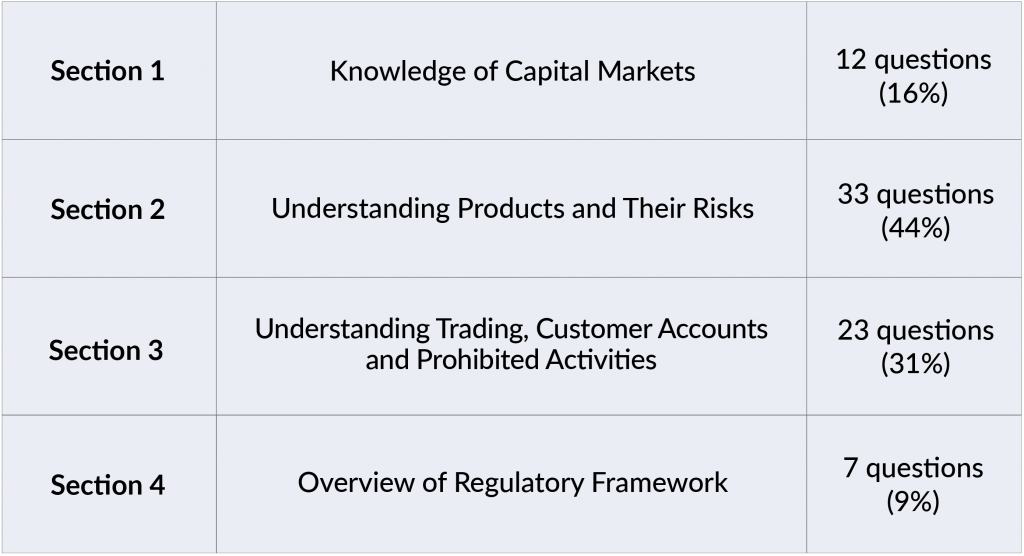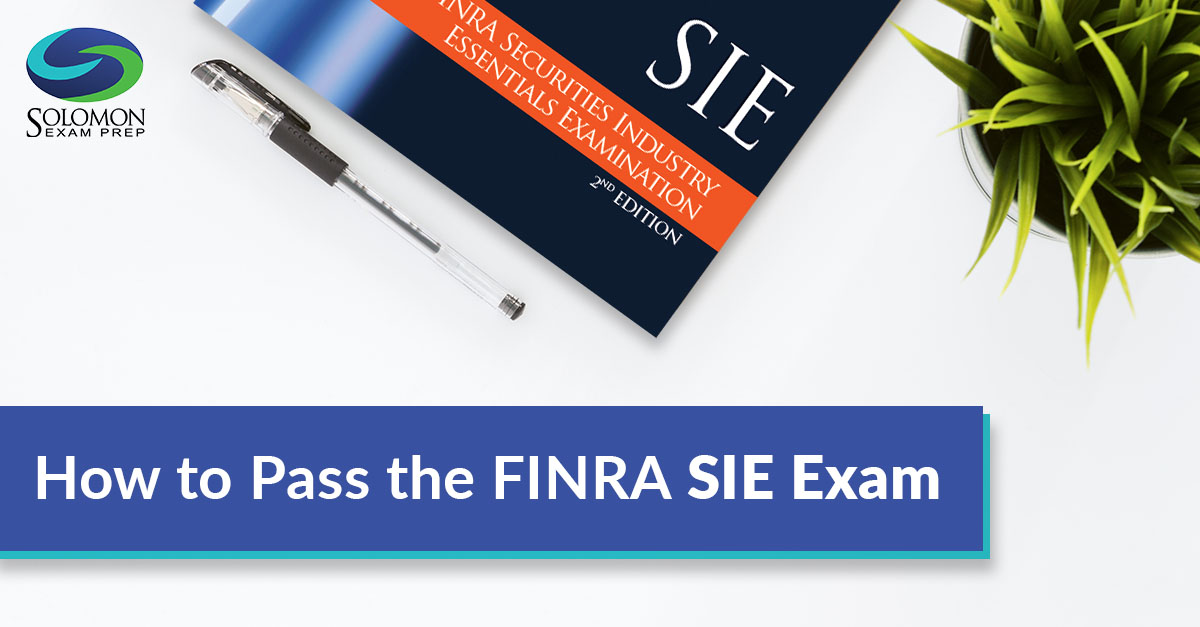Updated June 9, 2022
Should I Take the SIE Exam?
Are you interested in the world of stocks, bonds, and investments? Thinking about a career as a financial advisor? Or perhaps your goal is to become an investment banker or a hedge fund manager? There are many attractive career options in the securities industry, but no matter which path you’re considering, you’ll probably need to take the Securities Industry Essentials (SIE) Exam.
If you’re not sure whether a career as a securities industry professional is right for you, the SIE is a great way to test the waters. For college students, the SIE provides a broad overview of the securities industry and financial knowledge that will be helpful even if you don’t pursue a securities industry career. And passing the SIE will make you more competitive when looking for a financial or investment-related internship.
For job seekers in general, having the SIE under your belt shows potential employers that you are serious about a career in the industry and have mastered industry fundamentals. And because the SIE is a co-requisite to several securities industry qualification exams, passing it allows you to jumpstart your career goals.
What is the SIE Exam?
The SIE exam is an introductory-level exam that covers fundamental securities industry knowledge. The SIE focuses on industry terminology, securities products, the structure and function of the markets, regulatory agencies and their functions, and regulated and prohibited practices.
The SIE is a co-requisite of several qualification exams, including the Series 6, Series 7, Series 22, Series 79, Series 82, and Series 99. Passing the SIE does not qualify you to become a registered securities industry professional, but it is usually the first step. Because the SIE is “co-requisite,” instead of “pre-requisite,” you don’t have to take the SIE before taking other FINRA exams. However, taking the SIE first is highly recommended because what you learn on the SIE is extremely helpful to you when you take any other security exam. The knowledge that you learn on the SIE is wind in your sails when you take any other registered representative level securities qualification exam, such as the Series 6 or Series 7.
Any individual 18 or older may take the SIE exam. Unlike other FINRA securities exams, employment and sponsorship by a FINRA member firm is not required in order to take the SIE, and exam results are valid for four years. Individuals can sign up to take the SIE exam on the FINRA website by creating an account, paying the $80 exam fee, and scheduling the exam. The SIE can be taken at a Prometric test center or online via the ProProctor platform.
About the Exam
The SIE exam consists of 75 scored and 10 unscored multiple-choice questions covering the four sections of the FINRA SIE exam outline. The 10 additional unscored questions are ones that the exam committee is trying out. These are unidentified and are distributed randomly throughout the exam. FINRA updates its exam questions regularly to reflect the most current rules and regulations.

Note: Scores are rounded down to the next lowest whole number (e.g. 69.9% would be a final score of 69% – not a passing score for the SIE exam).
Topics Covered on the Exam
FINRA divides the SIE exam into four sections:

The SIE exam covers many topics including the following:
-
- Common Stock
- Preferred Stock, Warrants, Rights and ADRs
- Bonds and Yields
- Types of Bonds
- Treasury Securities, ABS, CMOs, and Munis
- Mutual Funds and Other Investment Companies
- Life Insurance Products and Municipal Fund Securities
- Options, Partnerships, Hedge Funds, and Private Placements
- Risks
- Customer Disclosures & Taxation
- Underwriting, Issuing, and Registering Securities
- Exemptions from Registration & Types of Broker-Dealers
- Markets, Financial Institutions, and Clearance & Settlement
- Economic Factors and Business Cycles
- Tools of Government Policy and International Factors
- Opening an Account & Types of Accounts
- Cash and Margin Accounts
- Order Processing
- Handling Corporate Actions, Account Compliance, and SIPC Rules
- Prohibited Activities and Trading Rules
- FINRA Conduct Rules
- FINRA Membership
Question Types on the SIE Exam
The SIE exam consists of multiple-choice questions, each with four options. You will see these question structures:
Closed Stem Format:
This item type asks a question and gives four possible answers from which to choose.
When interest rates go up, what happens to the price of typical preferred stock?
-
- It rises.
- It falls.
- It stays the same.
- It is unrelated to interest rates, so it is impossible to tell.
Incomplete Sentence Format:
This kind of question has an incomplete sentence followed by four options that present possible conclusions.
ADRs trade in:
-
- The foreign currency that underlies the ADR
- U.S. dollars
- A combination of foreign currency and U.S. dollars
- A special exchange rate that takes into consideration how much foreign currency can purchase one U.S. dollar
“EXCEPT” Format:
This type requires you to recognize the one choice that is an exception among the four answer choices presented.
All of the following are advantages to the issuer of debt financing over equity financing except:
-
- No ownership dilution
- No loss of control
- Interest payments are a deductible business expense
- Fixed repayment schedule
Complex Multiple-Choice (“Roman Numeral”) Format:
For this question type, you see a question followed by two or more statements identified by Roman numerals. The four answer choices represent combinations of these statements. You must select the combination that best answers the question.
The prices of which of the following two types of preferred stock are least sensitive to changes in interest rates?
-
- Participating preferred
- Cumulative preferred
- Adjustable-rate preferred
- Convertible preferred
-
- I and II
- II and III
- I and IV
- III and IV
This format is also used in items that ask you to rank or order a set of items from highest to lowest (or vice versa), or to place a series of events in the proper sequence.
Rank the following yields for a premium bond held to maturity from highest to lowest.
-
- Yield to call
- Coupon rate
- Yield to maturity
- Current yield
-
- II, IV, III, I
- IV, I, III, II
- II, IV, I, III
- III, I, IV, II
For an even better idea of the possible question types you might encounter on the SIE exam, try Solomon Exam Prep’s free SIE Sample Quiz and SIE Sample Exam.
How to Study for the SIE Exam
Follow Solomon Exam Prep’s proven study system:
-
- Read and understand. Read the Solomon SIE Study Guide, carefully. The SIE is a knowledge test, not an IQ test. Many students read the Study Guide two or three times before taking the exam. To increase your ability to focus while reading, or as an alternative to reading, listen to the Solomon SIE Audiobook, which is a word-for-word reading of the Study Guide.
- Answer practice questions in the Solomon Exam Simulator. When you’re done with a chapter in the Study Guide, take 4–6 chapter quizzes in the Solomon Online Exam Simulator. Use these quizzes to give yourself practice and to find out what you need to study more. Make sure you read and understand the question rationales. When you’re finished reading the entire Study Guide, review your handwritten notes once more. Then, and only then, start taking full practice exams in the SIE Exam Simulator. Aim to pass at least six full practice exams and try to get your Solomon Pass Probability™ score to at least an 80%; when you reach that point, you are probably ready to sit for the SIE exam.
Use these effective study strategies:
-
- Take handwritten notes. As you read the SIE Study Guide, take handwritten notes and review your notes every day for 10 to 15 minutes. Studies show that the act of taking handwritten notes in your own words and then reviewing them strengthens learning and memory.
- Make flashcards. Making your own flashcards is another powerful and proven method to reinforce memory and strengthen learning. Solomon also offers digital flashcards for the SIE exam.
- Research. Research anything you do not understand. Curiosity = learning. Students who take responsibility for their own learning by researching anything they do not understand get a deeper understanding of the subject matter and are much more likely to pass.
- Become the teacher. Studies show that explaining what you are learning greatly increases your understanding of the material. Ask someone in your life to listen and ask questions. If you don’t have anyone, explain it to yourself. Studies show that helps almost as much as explaining to an actual person (see Solomon’s previous blog post to learn more about this strategy!).
Take advantage of Solomon’s supplemental tools and resources:
-
- Use all the resources. The Resources folder in your Solomon student account has helpful information, including a detailed study schedule that you can print out – or use the online study schedule and check off tasks as you complete them.
- Watch the Video Lecture. This provides a helpful review of the key concepts in each chapter after reading the Solomon SIE Study Guide. Take notes to help yourself stay focused.
-
Good practices while studying:
- Take regular breaks. Studies show that if you are studying for an exam, taking regular walks in a park or natural setting significantly improves scores. Walks in urban areas or among people did not improve test scores.
- Get enough sleep during the period when you are studying. Sleep consolidates learning into memory, studies show. Be good to yourself while you are studying for the SIE: exercise, eat well, and avoid activities that will hurt your ability to get a good night’s sleep.
You can pass the FINRA SIE Exam! It just takes focus and determination. Earning this certification will provide valuable knowledge and open up rewarding career opportunities. Solomon Exam Prep is here to support you on your first step to entering the securities industry.
To explore all Solomon Exam Prep’s SIE study materials, including product samples, visit the Solomon website here.
For more helpful securities exam-related content, study tips, and industry updates, join the Solomon email list. Just click the button below:


